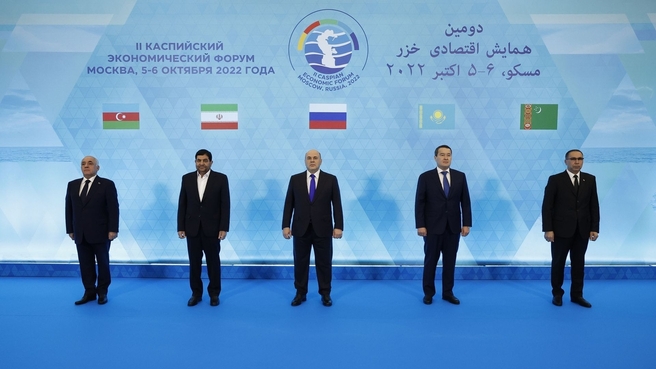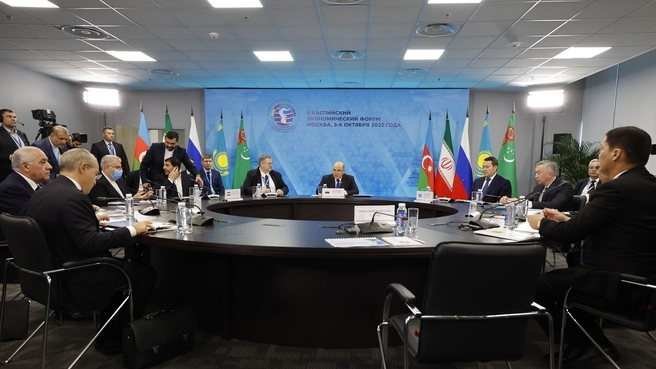From 5 to 6 October, 2022, Moscow hosted the second Caspian Economic Forum, which became the most important platform in the post-pandemic period for discussing topical issues of cooperation between the countries of the Caspian region.
The two-day forum was attended by over a thousand delegates and not only from the Caspian countries, but also from Belarus, Kyrgyzstan and Uzbekistan.
The agenda of the forum meetings covered such topics as the implementation of joint projects in the field of transport infrastructure, energy, environmental protection, as well as the development of interregional cooperation and humanitarian ties.
On Thursday, Russian Prime Minister Mikhail Mishustin met with the heads of delegations of the participating countries – Prime Minister of Azerbaijan Ali Asadov, Prime Minister of Kazakhstan Alikhan Smailov, First Vice President of Iran Mohammad Mohber and Deputy Prime Minister of Turkmenistan Khojamurad Geldymuradov.
“Our meeting is taking place in the development of the sixth Caspian summit, which took place on 29 June in Ashgabat. The heads of state discussed the most important issues of cooperation in the Caspian Sea, put forward a number of new initiatives in the economic, trade, energy, transport and cultural spheres, as well as a large number of initiatives in the field of ecology,” Mishustin said.
The meeting in a narrow format reviewed the most promising economic projects that can be launched in between five countries and assessed the progress of work on the implementation of the agreements reached at the Caspian summit.
Then, a plenary session of the forum was held, during which the heads of delegations made speeches.
Caspian Sea has a strategic position in Eurasia
Here are the highlights from Mikhail Mishustin’s speech at the CEF plenary session describing the current state of cooperation in the Caspian region:
- For Russia, the Caspian Sea is of great importance, primarily taking into account its strategic position in the center of Eurasia, at the intersection of transport and energy arteries, as well as mineral wealth and unique biological resources.
- The Caspian countries may have different interests, but they are able to find mutually beneficial solutions in dialogue.
- Over the past 20 years, the total gross domestic product has almost tripled, and mutual trade has increased fivefold.
- Over the past five years, the share of Caspian countries in world GDP has grown to 3.6%, and mutual trade turnover has increased by one and a half times.
- The world is seeing the emergence of new development hubs, one of which is the Caspian region.
- The region should become one of the largest transcontinental transportation hubs in Eurasia. This will contribute to the formation of regional markets, the expansion of trade and production cooperation.
- Last year, the traffic along the North-South corridor amounted to about 14 million tons. Thisindicatorisexpectedtodoubleby
- It is necessary to create conditions for the launch of seamless logistics services – from the Urals, the Volga region, the Baltic – from all over Russia to the Persian Gulf. And onward – to South Asia and the Middle East, to Africa.
- The urgent task is the transition to settlements in national currencies.
- Another strategic task is to deepen business cooperation and create new production chains.
- At the summit in Ashgabat, a proposal was put forward to develop a five-party agreement in the field of culture. We support such an initiative.
- The Caspian coast can accommodate at least 1 million travelers annually. Iran has submitted to the parties a draft agreement on cooperation of the Caspian states in the field of tourism. And at the suggestion of Azerbaijan, a draft agreement on cooperation in the organization of cruise routes in the Caspian Sea has been developed.
- Coordinated steps are needed to maintain the biological diversity of the reservoir.
- The Caspian region has a special role in the Great Eurasian Partnership, envisaging trade and economic cooperation of the largest regional groups.
Orient: Turkmenistan urges Caspian littoral countries to develop partnership in energy
Deputy Prime Minister of the Turkmen government Khojamyrat Geldymyradov, speaking at the Caspian Economic Forum in Moscow on Thursday, called on the Caspian countries to cooperate in the energy sector.
“One of the most important outcomes of this year’s Caspian Summit in Ashgabat was the confirmation of our countries’ interest in expanding cooperation in the energy sector, the development of which has become relevant today not only for our region, but also for the entire world,” Geldymyradov said.
According to him, “the Caspian countries have huge natural resources and a developed fuel and energy industry.”
“Oil production in our countries in 2021 amounted to 13.7 million barrels, or 20% of world production. Natural gas production exceeded 1 billion cubic meters, or 26% of the world volume. The countries of the region generate 6% of the world’s electricity,” the representative of Turkmenistan stressed.
In his opinion, increasing the level of coordination of interstate activities aimed at creating favorable conditions for the implementation of joint projects in the fuel and energy sector remains relevant.
“Additionally, we believe it’s critical that we coordinate our efforts to establish a commodities distribution system that will enable us to fully handle the concerns of building trade infrastructure and establishing export routes,” Khojamyrat Geldymyradov stressed. ///Orient, 6 Oct
TASS: Turkmenistan called for the removal of transport barriers in the Caspian countries
Turkmenistan stands for strengthening efforts to eliminate barriers in the transport and communication sphere of the Caspian states. This was stated on Thursday by Deputy Chairman of the Cabinet of Ministers of Turkmenistan Khojamurat Geldymuradov, speaking at the plenary session of the Caspian Economic Forum.
“In our opinion, the practical implementation of the agreement between the governments of the Caspian littoral states on cooperation in the field of transport, signed in Aktau on 12 August 2018, is important. <…> In this regard, we beliýe it is çruiçal to expand multilateral transport cooperation, as well as to strengthen work on identifying and removing barriers in the transport and communication sphere, to intensify assistance in opening and developing new transport and logistics corridors in order to raise communication potential,” he said.
Geldymuradov noted that Turkmenistan pays special attention to the transport sector as an intensively developing and promising segment of the national economy. “Today, our country carries out transport and transit corridors in the North-South and West-East directions, actively participates in the creation of international transport corridors Turkmenistan – Azerbaijan – Georgia – Turkey, Uzbekistan – Turkmenistan -Iran – Oman – Qatar and TRACECA. In addition, a project has been implemented to build road and railway bridges across the Amu Darya, international airports in Ashgabat, Turkmenbashi, Turkmenabad and Kerki, as well as the international seaport of Turkmenbashi,” he recalled.
Turkmen DPM also spoke about the creation of a single “commodity distribution system” of the Caspian region countries.
“We consider it necessary to join our efforts to form a commodity distribution system that will allow us to comprehensively address the issues of developing trade infrastructure and creating export channels,” he said.
Geldymuradov called the harmonization of legislation in the areas of digital trade, customs procedures and certification, cooperation of control and supervisory authorities, as well as the organization of cross-border flows important areas for cooperation between the Caspian “five” countries. /// (based on TASS reports)
Joint communique of the Second Caspian Economic Forum – key points
Following the results of the forum, a joint communique was adopted. According to the statement, the heads of the delegations confirmed their interest in establishing cooperation between the Caspian countries in order to increase trade turnover and mutual investments, stressed the importance of developing cooperation in industry, in the field of creating a comfortable urban environment.
They stated that multilateral cooperation in the Caspian Sea will help to offset the negative effects of the pandemic on the economies of the Caspian states, as well as the current turbulence in global economic processes.
The parties expressed their readiness to continue efforts to further diversify contacts in the Caspian Sea in order to further increase the investment attractiveness of the region.
They welcomed the cooperation in the field of development of international transport corridors, including the North-South ITC.
The heads of the delegations reaffirmed their nations’ shared stance that the Caspian Sea is a sea of peace, friendship and cooperation and all issues related to the Caspian Sea are resolved peacefully through dialogue.
The Third Caspian Economic Forum will be held in Iran in 2023. ///nCa, 7 October 2022

